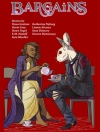Eight madcap tales of unpredictable dragons including one made of ice, another that takes refuge in the General Post Office, and a fire-breathing monster that flies out of an enchanted book and eats an entire soccer team!
Sobre o autor
She was born in 1858 at 38 Lower Kennington Lane in Kennington, Surrey (now part of Greater London), the daughter of a schoolteacher, John Collis Nesbit, who died in March 1862, before her fourth birthday. Her sister Mary’s ill health meant that the family moved around constantly for some years, living variously in Brighton, Buckinghamshire, France (Dieppe, Rouen, Paris, Tours, Poitiers, Angouleme, Bordeaux, Arcachon, Pau, Bagneres de Bigorre, and Dinan in Brittany), Spain and Germany, before settling for three years at Halstead Hall in Halstead in north-west Kent, a location which later inspired The Railway Children.
When Nesbit was 17, the family moved again, this time back to London, living variously in South East London at Eltham, Lewisham, Grove Park and Lee.
A follower of William Morris, 19-year-old Nesbit met bank clerk Hubert Bland in 1877. Seven months pregnant, she married Bland on 22 April 1880, though she did not immediately live with him, as Bland initially continued to live with his mother. Their marriage was an open one. Bland also continued an affair with Alice Hoatson which produced two children (Rosamund in 1886 and John in 1899), both of whom Nesbit raised as her own. Her own children were Paul Bland (1880-1940), to whom The Railway Children was dedicated; Iris Bland (1881-19??); and Fabian Bland (1885-1900), who died aged 15 after a tonsil operation, and to whom she dedicated Five Children And It and its sequels, as well as The Story of the Treasure Seekers and its sequels.
Nesbit and Bland were among the founders of the Fabian Society (a precursor to the Labour Party) in 1884. Their son Fabian was named after the society. They also jointly edited the Society’s journal Today; Hoatson was the Society’s assistant secretary. Nesbit and Bland also dallied briefly with the Social Democratic Federation, but rejected it as too radical. Nesbit was an active lecturer and prolific writer on socialism during the 1880s. Nesbit also wrote with her husband under the name ‘Fabian Bland’, though this activity dwindled as her success as a children’s author grew.
Nesbit lived from 1899 to 1920 in Well Hall House, Eltham, Kent (now in south-east Greater London). On 20 February 1917, some three years after Bland died, Nesbit married Thomas ‘the Skipper’ Tucker, a ship’s engineer on the Woolwich Ferry.
Towards the end of her life she moved to a house called ‘Crowlink’ in Friston, East Sussex, and later to St Mary’s Bay in Romney Marsh, East Kent. Suffe












